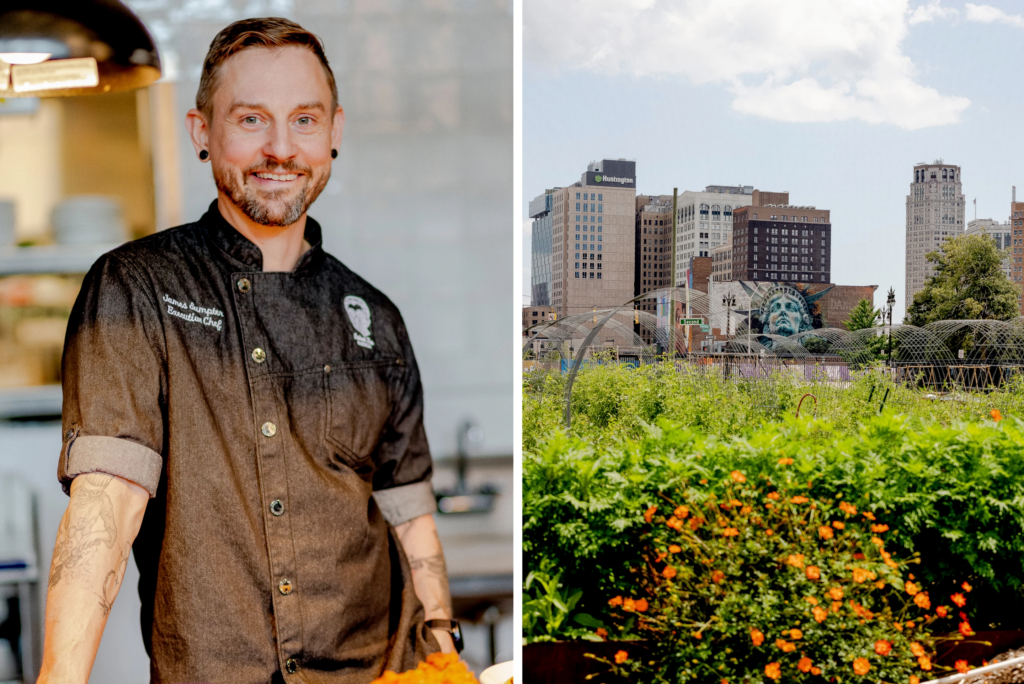These days, Detroit is often considered in terms of rebirth, revival, and comeback, a path forged and realized after the city’s bankruptcy filing in 2013. But that straightforward trajectory—from hopeless cause to creative hub—is a reductionist way to view the place that gave us both Motown and the automobile.
Most Detroiters will tell you not to call it a “comeback,” because the city isn’t going back to how it was. Instead, locals hope that Detroit’s ongoing redevelopment leads to a place with more equal opportunities for its diverse population.
This progress is most visible in its adaptive reuse projects, where husks of historic, sometimes derelict, buildings are being transformed into new centers of culture.
Take Michigan Central, a Beaux-Arts–era abandoned train station that reopened in 2024 as a 30-acre “innovation district” created by Ford Motor Company. The outdoor pavilion hosts public gatherings, while one of the buildings houses tech companies. Or look to the blocks and lots that residents have converted into public artworks. One example is the Heidelberg Project, started in 1986 by artist Tyree Guyton. Over the decades, he’s bedecked a city block with found objects such as stuffed animals, shoes, and entire cars.
We spoke with four Detroit-based leaders about how the city has inspired and shaped them. Sydney G. James is a prolific muralist; W.E. Da’Cruz is the cofounder of a plant-based food company; James Sumpter serves as executive chef at the new Cambria Hotel; and Robin Terry chairs the board of the Motown Museum. Then read on for our recommendations for where to shop, eat, play, and stay in the Motor City.

Opened in October 2023, Cambria Hotel Detroit Downtown is one of the more recent in a string of new hotels that reuse older buildings. At 154 rooms, it adds much-needed space for visitors downtown now that the city is attracting more large-scale conventions and events. As executive chef, James Sumpter oversees the hotel’s multiple food and beverage options. These include Cibo, a Mediterranean restaurant; Detroit Taco, a fast-casual Mexican spot; and the recently opened rooftop bar Cielo.
“I’ve been the executive chef for Cambria Hotel for about two years. The journey through construction and opening the hotel was, let me say, an undertaking. The building was the old WWJ radio station, one of the original radio stations with only three letters as opposed to four. That old building is where our hotel lobby is, but then you take a bridge over to the new building with all the hotel rooms. There’s a real art deco influence that’s been retained.
“I’m from Ann Arbor, Michigan. I had my first head chef role at the age of 20 and have worked all over the state, including in sushi bars and wine bars. I came to Detroit a couple of years ago not for a job specifically, but because I wanted to live in this city—a place with a little more excitement and where I could advance my career in a more aggressive way. There are a lot of people like me who came to Detroit to do something interesting.
“One thing I’ve noticed is that people in Detroit like exciting new flavors, but they also like soul food. For example, Cibo is a Mediterranean restaurant, but then I’ve put a twist on that. We have a fried chicken shawarma, but I’ve added a za’atar buttermilk biscuit and merguez sausage gravy on top.
“There’s also a big farm-to-table focus, because there are actually a lot of urban farmers in the area. The 2008 housing crisis hit Detroit really hard, and many properties became vacant for so long that they had to be torn down. People could then buy these lots for dirt cheap and turn them into green spaces. In fact, there’s one only a few blocks away from Cibo, called Featherstone Garden. Annie Hakim, the grower, uses sustainable and organic practices, and that’s where I often get our heirloom tomatoes, eggplants, and peppers.

